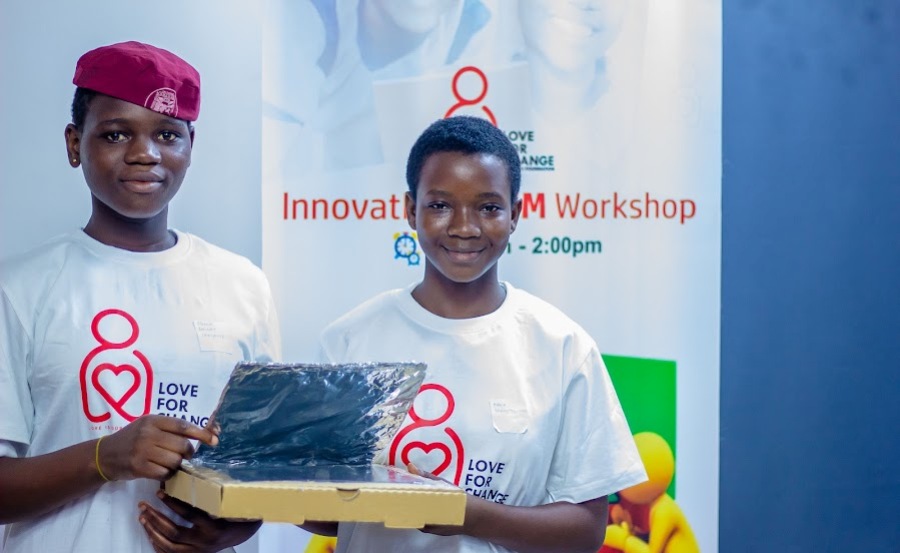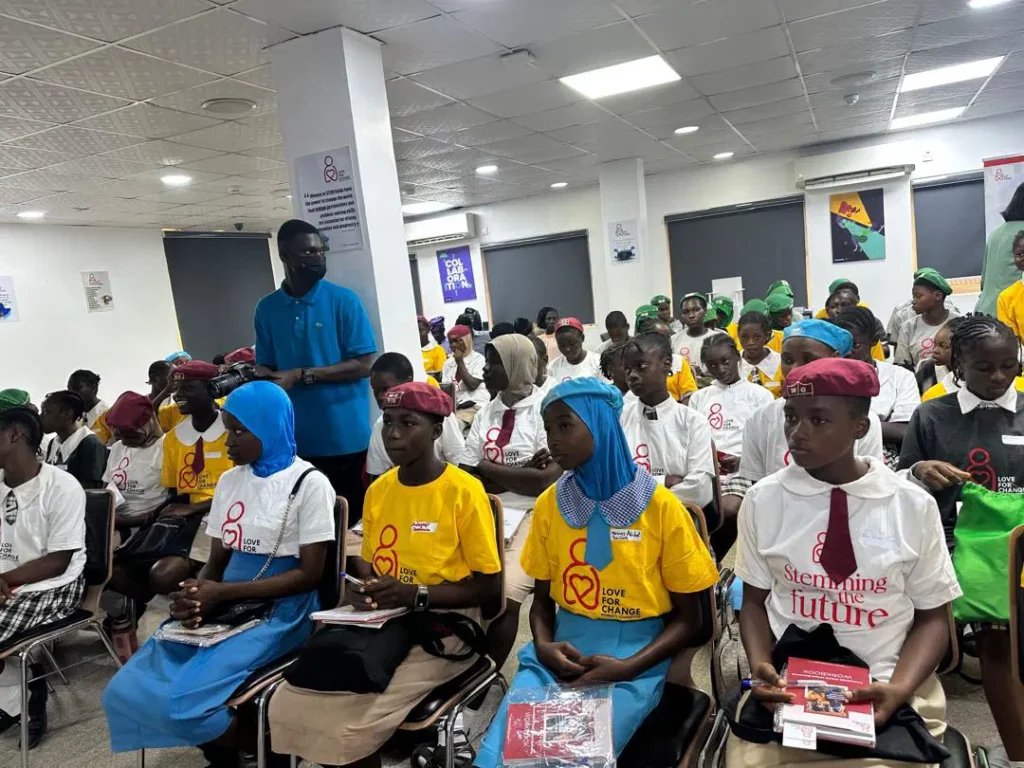In a compelling address during the culmination of the INNOVAT STEAM Bootcamp 2.0 in Lagos, Modupeola Bello Olukoya, Founder and Executive Director of the Love for Change Women Foundation (LCWF), underscored a growing crisis: countless girls in underserved communities are being left behind, not by a lack of talent, ambition, or potential, but by the absence of access to essential technology education.
Table of Contents

A Bootcamp Designed to Shift the Narrative
The INNOVAT STEAM Bootcamp 2.0, an intensive eight-week programme, was launched to confront this disparity head-on. Over 200 enthusiastic girls joined virtually, with the most driven 75 invited to a hands‑on finale in Lagos. For many, this marked their first encounter with vital STEAM disciplines such as robotics, Python programming, data analysis, and a creative Fashion & Design Workshop curated in collaboration with the iconic Lisa Folawiyo Studio.
“Our participants are not just learning skills—they’re building the confidence to lead and innovate,” Olukoya emphasized.
At its core, the bootcamp achieved more than merely transferring technical knowledge; it instilled a sense of empowerment. Young girls discovered in themselves the ability to design, to question, and above all, to lead. These outcomes reflect the globally recognised truth that digital skills, when paired with supportive networks, bolster innovation and sustained participation in tech for girls traditionally sidelined by systemic barriers.
Barriers Beyond Ability: When Access Is the Real Issue
Olukoya’s statement resonates with numerous global studies: the real impediment to female participation in technology is not a lack of intelligence or capability, but a lack of opportunity. A 2025 report by WillDom noted, “the real barrier was never ability; it was access,” echoing the challenges seen across continents..
In sub-Saharan Africa, digital access gaps compound this effect: only 22.6% of women had internet access compared to 33.8% of men by 2019. More revealingly, the gender skills gap—to do with basic competencies in coding, digital analysis, and problem-solving—is even more pronounced. This stark reality underscores why initiatives like INNOVAT are so crucial—they provide more than tools; they dismantle the systemic walls that prevent girls from exploring their own capabilities.
Holistic Learning: From Coding to Design Thinking
An innovative highlight of the bootcamp was the multidisciplinary Fashion & Design Workshop. Partnering with Lisa Folawiyo Studio, the program invited girls to reimagine fashion through a tech-driven lens. Placing creative logic alongside coding and data analytics connects seemingly disparate fields, reinforcing the idea that skills like critical thinking, computational fluency, and creative problem-solving are tightly interlinked.
Studies show that a holistic curriculum enhances learning outcomes. A 2020 research program in Australia (the OzGirlsEntrepreneurship program) found that combining STEM with entrepreneurship significantly boosted girls’ creative thinking, leadership, and risk-taking capacity. Women and girls learn best when they have room to think critically and innovate—an approach already yielding results at LCWF.
Building Confidence: From Awareness to Leadership
Olukoya’s bootcamp was more than a training series—it was a confidence-building movement. “Every girl deserves the opportunity to explore, innovate, and lead—to break generational barriers,” she told Vanguard, articulating a vision of female tech empowerment grounded in self-belief and support.
This mirrors global patterns: giving girls access builds momentum. Organisations like Girls Who Code—now internationally recognised—have shown that with access comes interest, and with that interest comes change. As of 2022, Girls Who Code has graduated over 500,000 young women equipped with foundational programming skills.
The Power of Partnerships: Scaling Through Collaboration
Tackling deep-rooted systemic barriers demands collective effort. Olukoya rightly praised the Lagos State Government and various stakeholders for their contributions to the bootcamp. She emphasised that scaling such impact requires unified commitment from public institutions, private enterprises, and non-profits.
Similar success stories across Africa reflect this principle. NGOs like Nigeria’s W.TEC (Women’s Technology Empowerment Centre), founded in 2008, have created long-term, sustainable models leveraging collaboration with schools, government bodies, and international partners. Building solidarity multiplies impact, creating more girls equipped to enter technology, entrepreneurship, or any field they choose.

Beyond Bootcamps: Sustaining the Momentum
The INNOVAT STEAM Bootcamp is just the beginning. For its gains to last, consistent reinforcement—through mentorship, peer networks, and pathways to internships or further training—is essential. As Bukola Adeyemi, the Foundation’s project assistant, put it:
“We’re bridging that gap by teaching coding, data analysis, critical thinking, and problem-solving. These foundational skills help them imagine a future as STEAM queens or tech leaders.”
Global evidence supports this: Women thrive in tech when they gain early exposure and ongoing support. A 2023 UNICEF report noted that mentorship and female role models dramatically improve retention rates in STEM education. In Africa, Cybersafe’s CyberGirls Fellowship, launched in 2019, equips young women with cybersecurity and AI training, offering both practical skills and career guidance.
The Call to Action: What’s Next in Nigeria
Olukoya’s closing appeal was clear: more boots on the ground, more funding, more partnerships, more strategic scaling. Nigeria needs multiple INNOVAT-style programmes across every region—summer camps in Kaduna, evening workshops in Onitsha, virtual courses reaching Bayelsa.
Scaling demands a comprehensive ecosystem: government subsidies, tech companies providing equipment, NGOs offering curricular frameworks, and global donors tying investments to measurable outcomes in participation and advancement.
The prize? An inclusive innovation economy, strengthened by diverse voices and perspectives. Research underscores this: companies with gender diverse teams generate 19% higher revenue due to innovation. More women in STEM lead to smarter design, safer systems, and broader solutions.

A Brighter Future in Sight
Nigeria stands at a crossroads. The energy, ideas, and potential are there—200 girls signing up for the LCWF bootcamp is proof enough. If society backs that potential, the return will be literal: tech leaders, entrepreneurs, educators, policymakers all rising from these empowered youths.
By addressing the “lack of access to tech skills stifling girls’ potential,” LCWF is reshaping not just lives, but legacies—breaking barriers for future generations. These girls won’t just be users of technology; they’ll be architects of change.
Wrapping Up
- Problem: Girls are stifled not for lack of ability, but lack of opportunity.
- Programme: INNOVAT STEAM Bootcamp delivered 8 weeks of transformative training.
- Result: Girls gained technical acumen and confidence to lead.
- Blueprint: Holistic, creative, inclusive learning is the future.
- Next Steps: Scale through partnerships, mentorship, and national outreach.
Join our WhatsApp community
Join Our Social Media Channels:
WhatsApp: NaijaEyes
Facebook: NaijaEyes
Twitter: NaijaEyes
Instagram: NaijaEyes
TikTok: NaijaEyes





